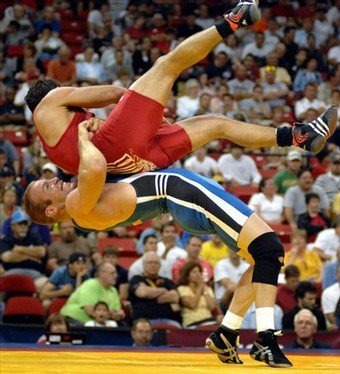 Charles Prebish
Charles PrebishClearly, I am no stranger to sports controversies. On Jan. 4, 1982 I published an essay in the New York Times entitled "Spirit of Sport Inspires New Faith," in which I argued that sport was the newest and fastest-growing religion in America. It raised havoc everywhere and was the focus of one of Howard Cosell's "Speaking of Sports" radio shows in which he lambasted my theory in front of a national audience. The following day, an Associate Dean at my university (Penn State) telephoned my office to accuse me of "blasphemy." Blasphemy notwithstanding, my 1993 book Religion and Sport: The Meeting of Sacred and Profane went on to become a standard volume on the relationship between religion and sport. I hope what follows will not be considered blasphemous, and that readers will resonate agreeably with the difficult ideas presented.
 A high-amplitude throw
A high-amplitude throwI'm sure when FILA changed the rules which have led to this situation, they intended quite the opposite ... but it just hasn't turned out that way. So we need to change the rules and promote scoring, excitement, and risk-taking. So here's three minor rule changes that I believe will change everything and restore our sport to splendor!
My first suggestion is to eliminate the three-period format and return to the previous format of one five-minute period. That will do away with some of the highly unjustified results that emerge from the three-period format. Now, you can win the first period with four one-point takedowns, lose the second period by being pushed out of bounds once by your opponent, and lose the third period by again being pushed out of bounds. Total points: 4 for you, 2 for your opponent (and none on truly offensive moves), but YOU LOSE. In addition, the one period format does not interrupt the continuity of the match as the three period format does. No more! ONE period, winner takes all.
My second suggestion involves re-emphasizing "passivity" calls on the part of the officials, including a disqualification following the third passivity warning. If a competitor knows that he/she will be disqualified following the third passivity warning, we'll start to see some of the offensive attacks that once made wrestling a beautiful and exciting sport. That also means officials will finally have to show some courage in actually enforcing the passivity rule. I remember many years ago when I went to my FILA qualifying tournament, a senior Class I mat official said to me, "If you EVER let a bout move into the final minute without either wrestler having scored any points or having disqualified one of the wrestlers for passivity, you will NEVER get your FILA license. Compare that mentality to what we see now in a 1-0, 0-1, 1-0 yawner.
My third suggestion involves eliminating the "clinch." It's a silly, artificial, hard to articulate maneuver. Just watching the officials trying to start wrestlers from the clinch position is almost laughable. It interrupts the flow of the match and it places too much emphasis on the official's timing and accuracy. The match is supposed to be about the wrestlers. The best official is the one you never remember seeing.
Speaking of officials, they need to change their approach as well. I was fortunate to work with several great officials when I was new to officiating. I worked with fellows like Mort Geller, Jerry Wager, and Eric Kopsch, and each was a remarkable mentor to new officials like myself. Curiously, they all said the same things. They always reminded me to (1) know the rules, completely and absolutely, (2) learn the mechanics of officiating so I could always anticipate the action and be in perfect position to make the correct call, and (3) to ALWAYS have the courage to enforce the rules of passivity, so each wrestler was expected to be aggressive continually throughout the match. Too many officials today, in both Olympic style and "folkstyle" wrestling simply do not do these three simple things.
If we can institute the above suggestions, I think our great sport will never again be in danger of losing its important position as a thrilling member of all future Olympic Games.
Charles Prebish is Professor Emeritus at both the Pennsylvania State University and Utah State University (where he held the Charles Redd Endowed Chair in Religious Studies). His research focuses on early Indian Buddhism, with emphasis on the monastic tradition and sectarian movement, and on the development of Buddhism in the West. He is the author of more than twenty books, and his books Buddhist Monastic Discipline (1975) and Luminous Passage: The Practice and Study of Buddhism in America (1999) are considered classic volumes in Buddhist Studies. In 1993 he held the Visiting Numata Chair in Buddhist Studies at the University of Calgary. Dr. Prebish has been an officer in the International Association of Buddhist Studies, and was the co-founder of the Buddhism Section of the American Academy of Religion. In 2005, he was honored with a "festschrift" volume by his colleagues titled Buddhist Studies from India to America: Essays in Honor of Charles S. Prebish. He recently published his memoir, titled An American Buddhist Life: Memoirs of a Modern Dharma Pioneer. Along with his wife Susan, who was also a USA Wrestling and FILA mat official, they officiated dozens of state, regional, and national Olympic-style wrestling tournaments. His son Rob is a multiple-time national champion, Freestyle and Greco-Roman champion at the 1989 World Maccabiah Games, and is author of the ebook The Solitary Wrestler: Methods for Safe Weight Control, about which former Olympic coach Greg Strobel has said, "Rob Prebish has done an outstanding job of researching and putting together the most comprehensive book on proper weight management I have ever read." Chuck is retired and lives in State College, Pennsylvania.


I agree passivity is a problem, but the solution is not even more subjective decision making by the officials. As long as it makes sense strategically to stall, people will stall.
Instead of awarding up to 5 points based on the officials estimate of the drama of the throw, how about simply awarding a point for a takedown? No extra points for beauty, no Russian judges giving the Russian divers 10's and the US divers 5's. Just takedown=1 point. If you get your opponent on his back, then you get back points. The existence of he 5-point move makes it far too dangerous to wrestle, since giving up such a move will win the period, or if you go back to a one-period match, it would win the match. So the only rational way to behave is avoid any chance of that.
Right now, there is no reason for a wrestler who has been taken down to do anything. Since there are no points for riding, and no points for an escape, the only thing to do is lie there and blocks attempts to turn him. What if you get another point for 30 seconds of riding, even if the guy on top does not manage to turn his opponent? Then the person on bottom has to try to get out, or concede another point. One could limit the amount of time one could ride, perhaps no more than 30 seconds, but meanwhile there is wrestling going on.
Get rid of the 5-point throw, get rid of the obsession with throwing as the ultimate goal, reduce further the responsibility of the official to enforce passivity rules, increase the value of a push out, award a point for 30 seconds of riding. All of these changes would make passive wrestlers give up points. Then being passive would cease to be good strategy.
First off, I would eliminate Greco-Roman wrestling and get the sport down to a single, understandable style. I know that Mr. Prebish and others would be disappointed in this, but I think it would be a positive step. Most non wrestler viewers of Greco-Roman, and even some wrestlers as well, have no idea of what is going on in Greco anyway. We all know this, but do not want to acknowledge it.
Second, to compensate for the loss of Greco, I would increase the number of weigh classes in freestyle from 7 to 10. We had more weight classes before and it was better competition and allowed more people to participate in terms of not being too big or too small for the current classes.
Third, I would institute an escape point like we have in folkstyle. In true fighting, one does not just sit there on the bottom if taken to the ground. Wrestling is supposed to represent controlled fighting, not a weird art form.
Forth, I would propose a collegiate style/ folkstyle world championship tournament in order to promote some of the advantages of our style of wrestling. In the beginning we would probably dominate and other countries would probably send their tenth string wrestlers, but it would eventually catch on if promoted correctly.
I have wrestled all three styles of wrestling, having been equally unsuccessful at all of them, and still feel that our folkstyle wrestling is still not only the most exciting and understandable, but the one with the most appeal to the general public. I say this, even though I am writing this letter as a Greek American now in Athens, Greece where I wrestled at various times when I was young (a long time ago).
Thanks again to Mr. Prebish for starting the ball rolling on this subject.